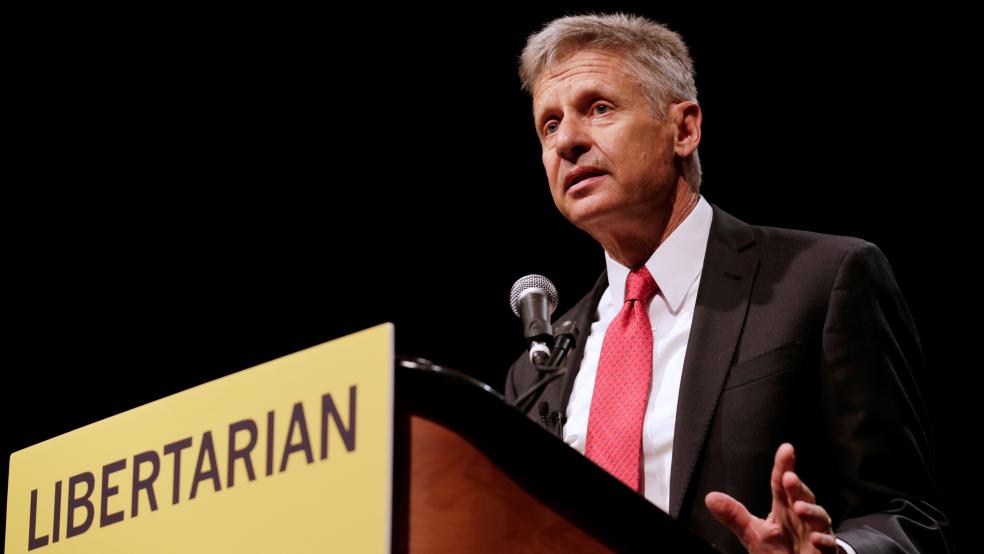It’s sadly fitting that in a year when the likely presidential nominees for the two major parties are both as widely disliked as Democrat Hillary Clinton and Republican Donald Trump, the presence of a plausible challenger from a third party has no effect on the race because supporters leave the two major party candidates in roughly equal numbers.
Whether that is how it will play out in November, of course, remains to be seen. Right now, though, according to the RealClearPolitics polling averages, the Libertarian Party ticket is performing better than it ever has in presidential public opinion polls while drawing supporters from Clinton and Trump at roughly the same rate.
Related: Could Libertarian Gary Johnson Play the Spoiler in November?
The Libertarians have former New Mexico governor Gary Johnson at the top of the ticket and former Massachusetts governor William Weld as the party’s vice presidential candidate, and Johnson is polling at about 8 percent nationally -- remarkably high for a Libertarian by historical standards.
Relatively little-known to average voters, the Libertarian Party is generally in favor of personal freedom and individual choice, achieved primarily by limiting the size and authority of the government. This puts it at odds with both parties in different policy areas. Libertarians will fight the Democrats on issues like government regulation and spending, but will challenge Republicans just as strongly on government intrusion into the people’s private sexual lives, on abortion rights and aggressive use of the military.
Though the Libertarians have had a ticket on the presidential ballot every year since 1972, their high water mark -- really not that high at 1.06 percent of the vote -- came 36 years ago in 1980.
What’s particularly interesting about the candidacy of Johnson and Weld, both two-term Republican governors in majority Democratic states, is where they appear to be finding their support. The RCP polling average tracks major national polls on a rolling basis, and when voters have been asked to choose a candidate for president in a two-way race between Clinton and Trump, Clinton has been consistently ahead. The RCP average as of Thursday night had Clinton with 44.6 percent of the potential vote and Trump with 39.8 percent.
However, when Johnson is added to the mix, Clinton falls to 41.4 percent and Trump to 36.5, with Johnson claiming 8 percent. That suggests that Johnson is pulling 3.2 percent of the vote from Clinton and 3.3 percent from Trump, a statistically insignificant difference.
Johnson and Weld, to be sure, are trying very hard to appeal to voters from both sides of the traditional aisle, as they do in this advertisement released today.
Related: A Cautionary Tale for Donald Trump as Boris Johnson Steps Aside
It seems safe to say that, their public professions to the contrary, neither Johnson nor Weld seriously expects to be in the White House next January. So the effect they are having on the race is a bit ironic. While they’ve tried to cast Clinton and Trump as two sides of the same establishment coin, even adopting the term “ClinTrump” to refer to them, it’s pretty plain that their hearts aren’t in it.
Asked about Clinton during a CNN town hall on June 22, Johnson called her “a wonderful public servant.”
When his turn came, Weld referred back to the time when they were both staff members on the commission investigating the Watergate scandal. “Old friend,” he said. “Nice kid. Knew her in her 20s. We shared an office in the Nixon impeachment, real bond, lifelong. Seriously. Not kidding.”
Related: Clinton’s VP List May Have Just Gotten a Little Shorter
They couldn’t manage anything close to the same for Trump. Asked to describe him in one word, Johnson waffled, “I’m sure there’s something good to say about Donald somewhere. I’m sure.”
When he was asked to come up with his one word for Trump, weld didn’t hesitate. “Huckster,” he said.





